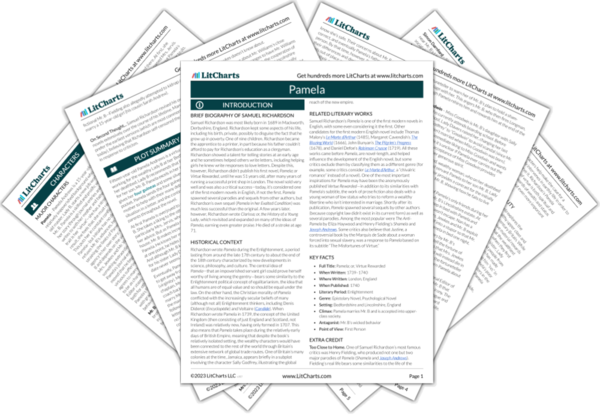Summary
Analysis
Pamela continues to write to her mother and father, even though she isn’t sure how her writing will get to them, since she doesn’t have John to carry her letters. She begins telling the story of the Thursday she on which she was supposed to leave. On that day, the other servants are all sad to see her go, with Mrs. Jervis crying all night long. But as she gets in the coach to start her trip, she soon notices that they were taking an unfamiliar path.
Although the Editor revealed that John is working for Mr. B and not delivering some of Pamela’s letters, Pamela still trusts him because she doesn’t know this yet for herself. Pamela’s popularity with the other servants shows how her virtuous nature seems to naturally win other people over; the servants are the first to recognize Pamela’s virtuousness because they belong to the same social class as Pamela.
Themes
Quiz
Test Yourself
On her trip home, the coachman lies to Pamela, telling her that he’s lost, yet still going fast. Eventually, it gets dark, and they have to pull off the road at a farmhouse. When they arrive, Pamela asks the farmer if he knows of Mr. B, and the farmer replies that in fact Mr. B is the landlord. This frightens Pamela, but the farmer and his wife try to reassure her. After she calms down, they leave her alone to read a letter she just received.
Despite Pamela’s popularity among the servants, they still fear Mr. B and follow his orders, and so the coachman goes along with Mr. B’s plan to kidnap Pamela, even though he likes Pamela personally. Mr. B continues to haunt Pamela even after she leaves his Bedfordshire estate, with even this farmer and his family seemingly acting as Mr. B’s spies.
Themes
Quiz
Test Yourself
The letter is from an “admirer” (who is clearly Mr. B.). It says that Pamela will have to spend a few weeks away while he settles some affairs that will cause her to see him differently. While this doesn’t comfort Pamela, she’s glad to hear that she’s not in any immediate danger. She goes to talk to the farmer, who shows her the letter he himself received from Mr. B, telling him that Pamela is in the middle of a disgraceful love affair and must stay at the farmhouse, even against her will.
By getting Pamela out of the Bedfordshire house where people know her, Mr. B is able to exert more control over her, since the farmer and his wife don’t know enough about Pamela’s personality to know that Mr. B is lying. When Pamela loses her personal identity and becomes just another servant girl, Mr. B has an easier time using his privilege to spread lies about her.
Themes
Quiz
Test Yourself
The next day, the coachman begins to take Pamela from the farmhouse to the actual estate where she’ll be staying. Along the way, they stop at an inn, and Pamela hopes maybe she’ll be able to ask for help from a stranger, but it turns out that the sister of Mrs. Jewkes (who is the housekeeper of Mr. B’s country home in Lincolnshire) is waiting for her at the inn to prevent any such escape attempt. She keeps Pamela there until Mrs. Jewkes herself arrives. Pamela feels even less safe than at the farmhouse, as if she’s in the hands of a “wicked procuress.”
A “procuress” is a woman who arranges sex work. Pamela’s fear that Mrs. Jewkes is a “procuress” shows how Mr. B views sex as transactional and believes that there is some price he can simply pay in order to do whatever he wants with Pamela. As later parts of the book also explore, Mr. B isn’t used to being told no, so he still believes that there is some way he can use his wealth and privilege to force Pamela to change her mind.
Themes
Quiz
Test Yourself
Get the entire Pamela LitChart as a printable PDF.

Mrs. Jewkes takes Pamela to the Lincolnshire estate where Mr. B has confined her for the next few weeks. Once they get there, Mrs. Jewkes starts calling Pamela “madam” (a title for a married woman), which Pamela feels is inappropriate. But Mrs. Jewkes suggests that she’ll have a good reason to call Pamela “madam” soon enough. Pamela says she hopes that Mrs. Jewkes won’t allow her master to do anything unlawful, and Mrs. Jewkes replies that she’s been ordered to treat Pamela with only respect. Pamela soon finds out that she doesn’t even have a bed yet at the new place and so must sleep at night with Mrs. Jewkes.
On the one hand, Mrs. Jewkes addresses Pamela as if she’s already married to Mr. B. On the other hand, however, Mrs. Jewkes doesn’t treat Pamela with the respect she’d use if Pamela were truly the lady of the house. She is following Mr. B’s orders, and so this shows how Mr. B wants to have it both ways: able to treat Pamela like his wife when he feels like it and able to dismiss her like a servant when he prefers that instead.
Themes
Literary Devices
Quiz
Test Yourself












